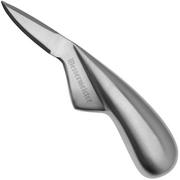

You have an outdated webbrowser. The website might not work correctly.
Shucking oysters with a normal kitchen knife is not only dangerous, but chances are also you damage the oyster meat or that parts of the shell end up in the oyster. Besides, if you were to use your general kitchen knives, you could damage them.
The shape of a good oyster knife prevents damage to the oyster meat and pieces of shell from getting in the meat. With a good oyster knife, shucking oysters is a piece of cake. The knife has a short, thick blade with tip that can handle prying movements. Some models have a protective barrier between the handle and the blade to keep your fingers safe. This features also prevents the knife from getting too deep inside the shell.
You'll find that there are different types of oyster knives available, including French, American and Japanese oyster knives. Each type has its own style and functionality. The Japanese oyster knife, also called a hõchõ, is made of high-quality stainless steel or carbon steel and is known for its sharp blade. An American oyster knife is very sturdy, and a French oyster knife has a more elegant design. When you're buying an oyster knife, it is nice to know which type of oyster knife will suit you.
Shucking oysters requires some practice and caution. It is important to take safety precautions, such as protecting your hands and wearing a cut-resistant glove. If you are new to oyster shucking, you can find a detailed explanation here.
When you slip when you open an oyster you can definitely hurt yourself. To protect yourself from injuries we recommend an oyster glove, also called cut-resistant gloves. These safety gloves are made of small metal rings to prevent the sharp edge of the knife reaching your skin.
The tip of an oyster knife is blunt rather than sharp. This is to prevent injury, as the tip is inserted into the hinge of the oyster and can slip. Sometimes oyster knives have a protective handle that prevents your hand from accidentally reaching the blade.